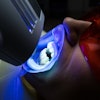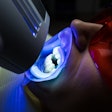Plasma-rich growth factor (PRGF) can aid in the surgical management of cancer patients on bisphosphonate therapy who require a tooth extraction, according to a new study in Oral Oncology.
For cancer patients who undergo intravenous (IV) bisphosphonate therapy, dental extraction is the main cause of bisphosphonate-related osteonecrosis of the jaw (BRONJ), the researchers noted (Oral Onc, April 5, 2012).
A team of Italian researchers conducted a case-control study on 176 patients treated with IV bisphosphonates for oncologic pathologies who also underwent dental extractions. The study was divided randomly into two groups: 91 were treated with PRGF (study group) and the other 85 were not (control group).
The researchers took panoramic x-rays and CT scans both before surgery and 60 months after surgery. By clinical and radiological diagnosis, BRONJ was diagnosed in only five patients in the control group six days after tooth extraction.
"We hypothesize that PRGF is important for the successful treatment of patients on bisphosphonates to restore the osteoblast/osteoclast homeostatic cycles via autologous cytokines," the study authors concluded. "Moreover, this protocol reduces the risk of BRONJ when it is necessary to perform dental extractions in patients undergoing IV bisphosphonate treatment."



















